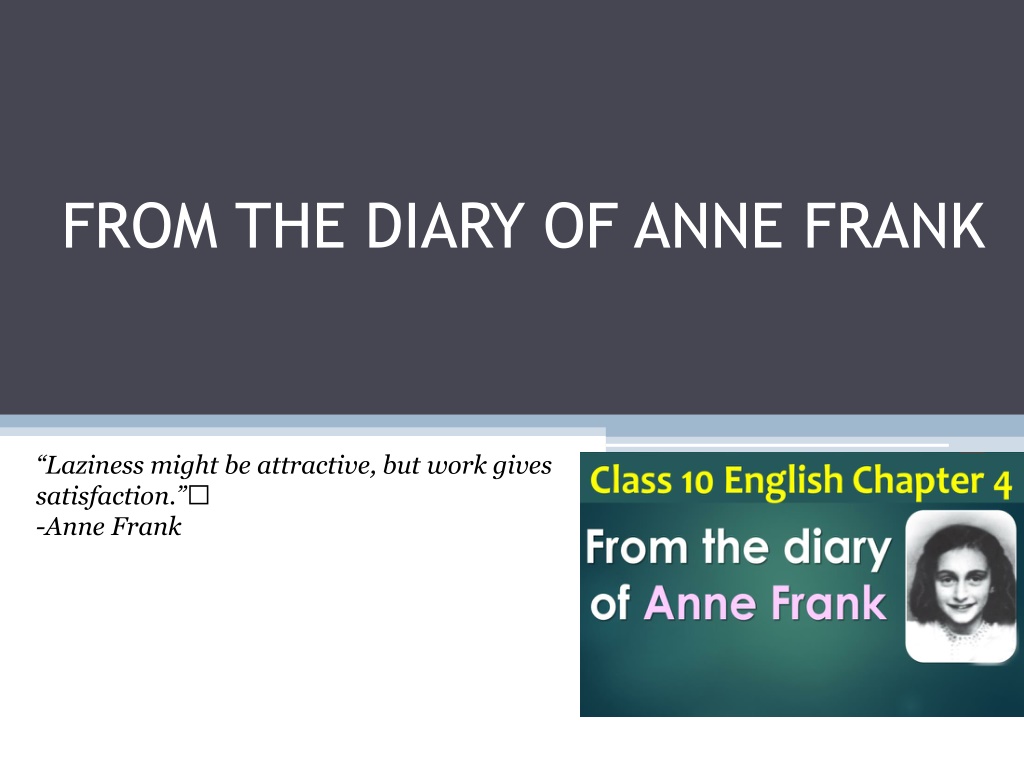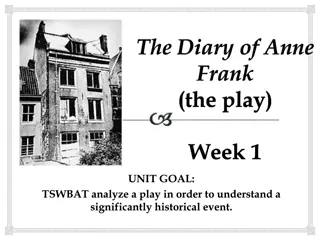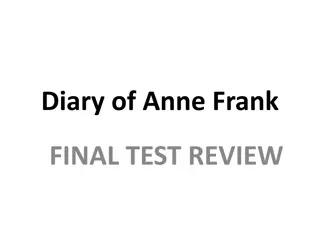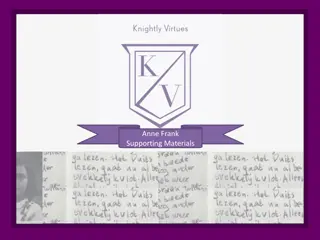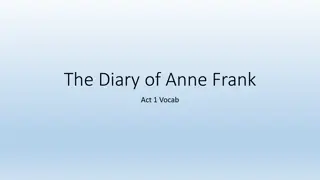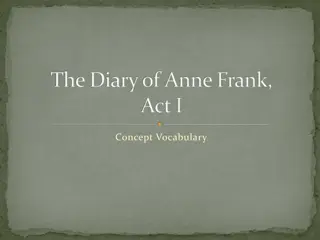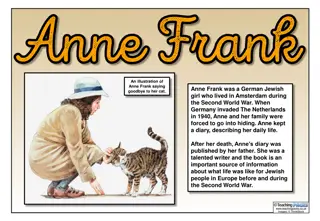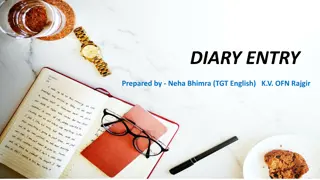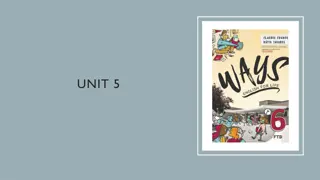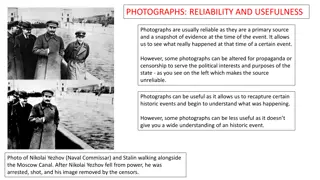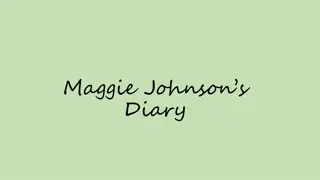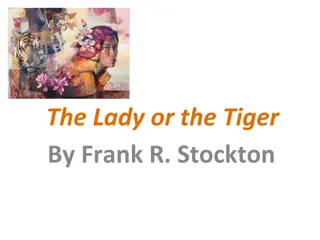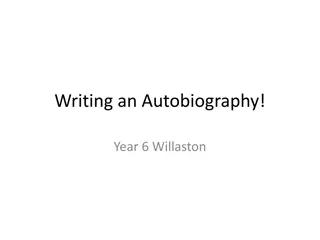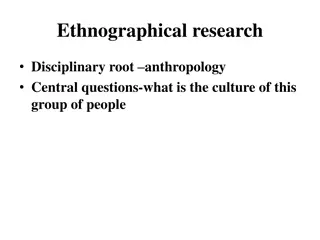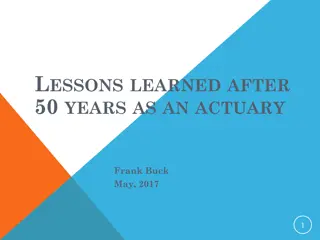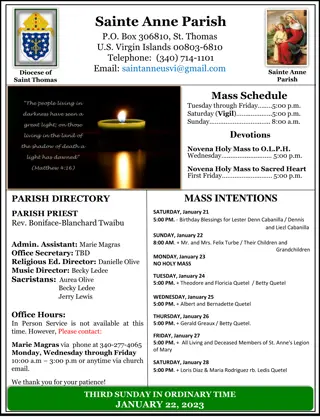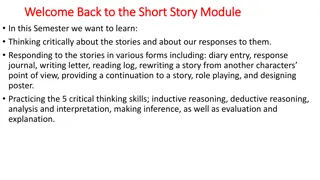Insights from the Diary of Anne Frank
The Diary of Anne Frank provides profound insights into the life of a young girl during challenging times. Anne reflects on the importance of work over laziness, the therapeutic nature of writing, and the patience of paper compared to people. Her diary captures the essence of adolescence, loneliness, and the desire for a true friend to confide in.
Uploaded on Sep 21, 2024 | 0 Views
Download Presentation

Please find below an Image/Link to download the presentation.
The content on the website is provided AS IS for your information and personal use only. It may not be sold, licensed, or shared on other websites without obtaining consent from the author. Download presentation by click this link. If you encounter any issues during the download, it is possible that the publisher has removed the file from their server.
E N D
Presentation Transcript
FROM THE DIARY OF ANNE FRANK Laziness might be attractive, but work gives satisfaction. -Anne Frank
INTRODUCTION This lesson is an excerpt from Diary of a Young Girl or The Diary of Anne Frank . It is an autobiography that was first published in 1947. In this, Anne expresses her thoughts in a diary which was gifted to her on her thirteenth birthday. She names the diary kitty which she considers as her only true friend. She mentions about her childhood, her family and a lot other things that she told no one else.
LESSON AND EXPLANATION WRITING in a diary is a really strange experience for someone like me. Not only because I ve never written anything before, but also because it seems to me that later on neither I nor anyone else will be interested in the musings of a thirteen-year -old schoolgirl. Oh well, it doesn t matter. I feel like writing, and I have an even greater need to get all kinds of things off my chest. Musings- a period of reflection or thought The author feels that it is strange and unusual for her to write in a diary about her feelings and experiences because it was the first time she was doing it. She feels this because she thinks that in the future, no one would be interested in reading about a young school going girl s past. She thinks that later, even she will not be interested in reading it. But then she puts these thoughts away and decides that she should write if she feels like doing so. She feels the need to write because there were a lot of thoughts she had been holding on to lately and she needed to get them off her mind. It is known that writing one s thoughts act as therapy; she makes the decision of writing a diary.
Paper has more patience than people. I thought of this saying on one of those days when I was feeling a little depressed and was sitting at home with my chin in my hands, bored and listless, wondering whether to stay in or go out. I finally stayed where I was, brooding: Yes, paper does have more patience, and since I m not planning to let anyone else read this stiff-backed notebook grandly referred to as a diary , unless I should ever find a real friend, it probably won t make a bit of difference. Now I m back to the point that prompted me to keep a diary in the first place: I don t have a friend. Listless- with no energy or interest Brooding- engaged in or showing deep thought about something that makes one sad, angry, or worried. Prompted- provoke The author feels that paper has much more capacity to absorb thoughts than people. People have low patience levels but a piece of paper, being a non living thing would not refuse from absorbing her thoughts. This realisation came to her one day when she was feeling more sad and confused than usual.
She could not even decide whether to go out or stay at home at that time. When she finally decided to stay at home, she sat being depressed and in deep thought. Again, she thought that paper had more patience and she decided to write everything that came in her mind because she did not intend on making someone read it unless she found a real friend . By real friend , she meant a friend with whom she could share all her secrets. The author then comes back to the point where she thought of beginning to write. It is because she is lonely and has no friend to talk to. Let me put it more clearly, since no one will believe that a thirteen-year-old girl is completely alone in the world. And I m not. I have loving parents and a sixteen-year-old sister, and there are about thirty people I can call friends. I have a family, loving aunts and a good home. No, on the surface I seem to have everything, except my one true friend. All I think about when I m with friends is having a good time. I can t bring myself to talk about anything but ordinary everyday things. We don t seem to be able to get any closer, and that s the problem. Maybe it s my fault that we don t confide in each other. In any case, that s just how things are, and unfortunately they re not liable to change. This is why I ve started the diary.
Confide- to tell personal things privately to a person that one trusts Liable- likely (here) She then goes on explaining why she feels the need for a friend. She feels that no one is going to believe that a young girl like her is so alone, which practically, she is not because she has a loving family, near about 30 people that can be called friends , loving aunts and a good place to stay. This depicts a clear picture of a happy family but the one thing that lacks in her life is the presence of a true friend with whom she can share everything. She does have a good time with friends; they talk about stuff but not real stuff that is actually going on in their lives. Despite trying hard, they are unable to get closer. She feels that maybe it is her who is not able to trust anyone with her private stuff that she is not able to come any close to her friends. She feels that the current situation can not be changed and thus, she needs to write her feelings in the diary.
To enhance the image of this long-awaited friend in my imagination, I dont want to jot down the facts in this diary the way most people would do, but I want the diary to be my friend, and I m going to call this friend Kitty . Since no one would understand a word of my stories to Kitty if I were to plunge right in, I d better provide a brief sketch of my life, much as I dislike doing so. Enhance- intensify, increase, or further improve the quality, value, or extent of. Plunge- jump or dive quickly Usually, when someone is writing in a diary, they list down all the facts about them in a formal manner which the author does not want to do. This is because she wanted to give her need for a friend a shape and thus, decides to name the diary as kitty . Hoping that someone would read her diary one day, she thinks that writing without giving details about the background story would be ineffective. So, despite not wanting to do so, she gives brief details about her life.
My father, the most adorable father Ive ever seen, didnt marry my mother until he was thirty-six and she was twenty-five. My sister, Margot, was born in Frankfurt in Germany in 1926. I was born on 12 June 1929. I lived in Frankfurt until I was four. My father emigrated to Holland in 1933. My mother, Edith Hollander Frank, went with him to Holland in September, while Margot and I were sent to Aachen to stay with our grandmother. Margot went to Holland in December, and I followed in February, when I was plunked down on the table as a birthday present for Margot. Adorable- lovable, cute Emigrated- leave one's own country in order to settle permanently in another. Plunked- to put down She refers to her father as the most lovable father one could get. He father married her mother when he was at the age of 36 and she was 25. She and her sister Margot were both born in Frankfurt.
As soon as Anne turned 4, her father moved to Holland followed by her mother in September while both the sisters stayed with their grandmother in Aachen. Margot was also sent to Holland in December followed by Anne in February who was brought as a birthday present for Margot. I started right away at the Montessori nursery school. I stayed there until I was six, at which time I started in the first form. In the sixth form my teacher was Mrs Kuperus, the headmistress. At the end of the year we were both in tears as we said a heartbreaking farewell. In the summer of 1941 Grandma fell ill and had to have an operation, so my birthday passed with little celebration. Farewell- an act of parting or of making someone s departure In Holland, Anne was sent to Montessori nursery school. (It was her first school) She started from first form. She had Mrs Kuperus, the headmistress, as her teacher in sixth form who even cried at the time of farewell. In 1941, the author s birthday could not be celebrated well because her grandmother fell ill and underwent an operation
Grandma died in January 1942. No one knows how often I think of her and still love her. This birthday celebration in 1942 was intended to make up for the other, and Grandma s candle was lit along with the rest. The four of us are still doing well, and that brings me to the present date of 20 June 1942, and the solemn dedication of my diary. Intended- planned Solemn- characterised by deep sincerity Dedication- commitment Unfortunately, her grandmother left them in January, 1942. Anne misses her grandmother more than anyone knows. This year s birthday was to be celebrated with great zeal so as to compensate for last year s. She then mentions that her family is doing well which sums up her background and brings her to the present date of June 20, 1942 when she is writing her diary.
Saturday, 20 June 1942 Dearest Kitty, Our entire class is quaking in its boots. The reason, of course, is the forthcoming meeting in which the teachers decide who ll move up to the next form and who ll be kept back. Half the class is making bets. G.N. and I laugh ourselves silly at the two boys behind us, C.N. and Jacques, who have staked their entire holiday savings on their bet. From morning to night, it s You re going to pass , No, I m not , Yes, you are , No, I m not . Even G. s pleading glances and my angry outbursts can t calm them down. If you ask me, there are so many dummies that about a quarter of the class should be kept back, but teachers are the most unpredictable creatures on earth. Quaking- shake or tremble Staked- bet, chanced Pleading- to make an emotional appeal Glances- take a brief or hurried look
Outbursts- a sudden release of strong emotion Dummies- an object designed to resemble and serve as a substitute for the real or usual one Unpredictable- not able to be predicted; changeable On June 20, 1942, Anne begins writing in her diary addressing it as her friend kitty . She mentions how her entire class is nervous about their results. It is unpredictable and will be decided by a meeting of teachers in which they will select students to be moved to next class or kept back. Many students were making bets. Some had put in their entire summer savings at stake. She and her friend, G, also made fun of the nervous boys. They kept on saying to each other that I am not going to pass! while others would console them and say, Yes, you would . G was polite as she tried to stop them from making noise while Anne scolded them, but none of it worked. According to Anne, about a quarter of class should not be allowed to pass because they hardly respond or take part in any of the activities. She refers to them as dummies . But this may not be the case because teachers decisions can t be predicted
Im not so worried about my girlfriends and myself. Well make it. The only subject I m not sure about is maths. Anyway, all we can do is wait. Until then, we keep telling each other not to lose heart. Not to lose heart- not be discouraged The author says that she is not bothered about her friends because she is sure that they will pass. The only thing subject that she is unsure about is mathematics. She seems to be having a tough time with the subject. But all they could do was wait for the results and not lose their hope. I get along pretty well with all my teachers. There are nine of them, seven men and two women. Mr Keesing, the old fogey who teaches maths, was annoyed with me for ages because I talked so much. After several warnings, he assigned me extra homework. An essay on the subject, A Chatterbox . A chatterbox what can you write about that? I d worry about that later, I decided. I jotted down the title in my notebook, tucked it in my bag and tried to keep quiet.
Old fogey- an old fashioned person Annoyed- slightly angry; irritated Chatterbox-a person who likes to chatter; talkative Jotted- write (something) quickly She tells how she has a great relationship with all her teachers except the maths professor. He was constantly irritated by the author s talkativeness. Despite several warnings, Anne did not stop talking in his classes which prompted him to give her extra homework as punishment. The first one was to write an essay on Chatterbox which she thought was a weird topic to write on because what could one write about that.For the moment, she wrote the topic in her notebook, kept it in her bag and focussed on staying quiet
That evening, after Id finished the rest of my homework, the note about the essay caught my eye. I began thinking about the subject while chewing the tip of my fountain pen. Anyone could ramble on and leave big spaces between the words, but the trick was to come up with convincing arguments to prove the necessity of talking. I thought and thought, and suddenly I had an idea. I wrote the three pages Mr Keesing had assigned me and was satisfied. I argued that talking is a student s trait and that I would do my best to keep it under control, but that I would never be able to cure myself of the habit since my mother talked as much as I did if not more, and that there s not much you can do about inherited traits. Ramble- to talk or write at length in a confused or inconsequential ways Convincing- capable of causing someone to believe that something is true or real; powerful Trait- quality Inherited- derived genetically from one's parents or ancestors.
The author came across the note she made as reminder for the essay after she had finished the rest of her homework. She began thinking about the topic. While chewing the tip of my fountain pen is a gesture that signifies a person is in deep thinking. While anyone could mention random stuff written for the sake of filling pages, she wanted to present concrete arguments in support of talking. She mentioned that she will try to better herself as a student but talking is something that cannot be eliminated completely. This is because she got it as an inherited trait from her mother and this is how she ended up writing 3 pages on the topic. Mr Keesing had a good laugh at my arguments, but when I proceeded to talk my way through the 2next lesson, he assigned me a second essay. This time it was supposed to be on An Incorrigible Chatterbox . I handed it in, and Mr Keesing had nothing to complain about for two whole lessons. However, during the third lesson he d finally had enough. Anne Frank, as punishment for talking in class, write an essay entitled Quack, Quack, Quack, Said Mistress Chatterbox .
Proceeded- to begin a course of action Incorrigible- not able to be changed Mistress- a woman in a position of authority or control The professor found Anne s arguments to be amusing but when she did not stop talking in the next lesson also, he gave her yet another assignment as punishment. The topic was An incorrigible chatterbox . Incorrigible refers to a bad habit that is difficult to change. He gave her this topic because he was annoyed of her unstoppable chattering during his lessons. On receiving this assignment, the professor did not say anything to her for a while but when he lost his patience, he handed her yet another assignment as punishment on the topic Quack, Quack, Quack, Said Mistress Chatterbox . The class roared. I had to laugh too, though I d nearly exhausted my ingenuity on the topic of chatterboxes. It was time to come up with something else, something original. My friend, Sanne, who s good at poetry, offered to help me write the essay from beginning to end in verse and I jumped for joy.
Mr Keesing was trying to play a joke on me with this ridiculous subject, but Id make sure the joke was on him. Roared- laughed (here) Exhausted- completely used up Ingenuity- the quality of being clever, original and inventive Verse- writing arranged with a metrical rhythm, typically having a rhyme Ridiculous- deserving or inviting derision or mockery; absurd When the professor scolded her for the third time and punished her, the whole class started laughing. As a result, she had to pretend to be amused too. After writing twice on similar topics, she ran out of thoughts. Thus, her friend Sanne who was good at poetry offered to help her write in rhyme. This whole assignment scenario was to make Anne feel ashamed but she made sure that she gave an effective reply. I finished my poem, and it was beautiful! It was about a mother duck and a father swan with three baby ducklings who were bitten to death by the father because they quacked too much. Luckily, Mr Keesing took the joke the right way.
He read the poem to the class, adding his own comments, and to several other classes as well. Since then I ve been allowed to talk and haven t been assigned any extra homework. On the contrary, Mr Keesing s always making jokes these days. Yours, Anne [Extracted from The Diary of a Young Girl, with slight adaptation] Contrary-opposite in nature, direction, or meaning She finally wrote her third assignment in the form of a poem which turned out to be great. She wrote a satire that a father swan bit his three baby ducklings to death because of their noisy nature. To her good luck, the professor took it lightly. The professor recited the entire poem in front of the class while giving his own remarks simultaneously. The author being fortunate enough, talked uninterruptedly after this incident without any further homework as punishment. Also, Mr keesing, the professor started cracking jokes every now and then in front of the class
SUMMARY In this lesson, Anne talks about being lonely and having no one to talk to despite being surrounded by family and around 30 people whom she called her friends . Thus, she takes the decision of writing her feelings in a diary. It is unusual for her to write in a diary but she is really in need of a true friend. Thus, she decides to name her diary kitty and unlike other people, she is not going to mention just facts in it. She starts with writing her background, to make it easier to understand for anyone who reads it later. She describes her family and early childhood when they all migrated, her early schooling. After giving a brief account of her background, she comes to the present day where she tells us about the result day. Everyone in the class is nervous about their result and boys are even making bets. Anne was quite sure about herself and her friends. She had a good equation with all the teachers except her maths professor, who was constantly annoyed at her for her talking habits. Thus, he started giving her punishments in the form of essays on weird topics such as Chatterbox to which she replied with full wit. She wrote essays that were funny and explained that this was a trait that she inherited from her mother and not much could be done about it. He kept on giving her essays until she wrote a satire. After that third and last assignment, Mr Keesing never pointed her out for talking.
QUESTION AND ANSWERS Q1. What makes writing in a diary a strange experience for Anne Frank? A. It was the first time Anne was writing in a diary. She felt that later no one would be interested in reading about the thoughts of a young girl. Both these facts made it a strange experience for her. Q2. Why does Anne want to keep a diary? A. Anne wanted to keep a diary and write in it because she had a lot going on in her head. She had no friend with whom she could talk about such personal stuff. Thus, she decided to maintain a diary. Q3. Why did Anne think she could confide more in her diary than in people? A. According to Anne Frank, paper has more patience than people . She chose to confide more in her diary because she felt there was no friend who could listen to her with enough patience.
Q4. Why does Anne provide a brief sketch of her life? A. Anne feels it would be weird to just simply jot down facts without giving her background. In case someone might read it in future, he/she won t be able to understand vaguely stated facts. Thus, she decided to provide a brief sketch of her life. Q5. What tells you that Anne loved her grandmother? A. The fact that Anne spent some part of her childhood with her grandmother is self-sufficient to imply connection between the two. Also, she explicitly mentioned in her diary that she misses her grandmother more than anyone is aware of is evident enough that she loved her grandmother. Q6. Why was Mr Keesing annoyed with Anne? What did he ask her to do? A. Mr Keesing, Anne s maths professor was annoyed with her because she would not stop talking during his lectures as a result of which, he gave her assignments as punishments.
Q7. How did Anne justify her being a chatterbox in her essay? A. Anne explained that she got this habit of speaking too much from her mother, mentioning that it was inherited. Q8. What made Mr Keesing allow Anne to talk in class? A. On being given the third assignment as punishment, Anne wrote a satirical piece which was quite promising. Thus, finally, the professor allowed her to talk. Q9. Was Anne right when she said that the world would not be interested in the musings of a thirteen-year-old girl? A. Yes, Anne was right in thinking that the world would not be interested in the musings of a thirteen - year - old girl. As she was a common girl, no one would want to know her feelings and so, no one would read her diary. Q10. There are some examples of diary or journal entries in the Before You Read section. Compare these with what Anne writes in her diary. What language was the diary originally written in? In what way is Anne s diary different?
A. Annes diary was actually written in Dutch. Her diary is different from that of others on various aspects. She had named her diary Kitty . She thought of it as her only true friend. She could confide in Kitty. She treated it as another person because according to her, Paper has more patience than people . She started by writing Dearest kitty and ended the account by writing, Yours Anne . Q11. Why does Anne need to give a brief sketch about her family? Does she treat Kitty as an insider or an outsider? A. Anne feels it would be weird to just simply jot down facts without giving her background. In case someone might read it in future, he/she won t be able to understand vaguely stated facts. Thus, she decided to provide a brief sketch of her life. She treates kitty as an insider as it was her only true friend with whom she could share each and everything. Q12. How does Anne feel about her father, her grandmother, Mrs Kuperus and Mr Keesing? What do these tell you about her? A. According to Anne, her father is the most lovable man one could ever come across. She loved and missed her grandmother more than she showed. She was on good terms with her teachers except the old fogey, Mr Keesing who taught them mathematics.
The headmistress, Mrs Kuperus was her class teacher and both were very close to each other. Mr Keesing often punished Anne with extra assignments as a punishment for her talkative nature. These indicate that Anne was affectinate and a loving person Q13. What does Anne write in her first essay? A. In her essay, Anne mentions that she will try her best to minimise talking between lectures but this is a trait she inherited from her mother and it is difficult to eliminate an inherited trait. Also, her mother talks as much as she does, if not more. She also stressed that talking was a necessary quality for a good student. Q14. Anne says teachers are most unpredictable. Is Mr Keesing unpredictable? How? A. Yes, Mr Keesing is an unpredictable person. He is angry with Anne for being talkative in class and gives her extra assignments as a punishment. But later, he finds her essays to be witty and amusing. This brings a change in him and he accepts her arguements. He develops a funny bone too and starts cracking jokes in the class. This change in Mr Keesing s nature shows that he is unpredictable.
VIDEOS https://www.youtube.com/watch?v=rKcma B2pSkE https://www.youtube.com/watch?v=VIrlD 9lEARk https://www.youtube.com/watch?v=PWxmGk 4cQos https://www.youtube.com/watch?v=5NOXv C59h-8
